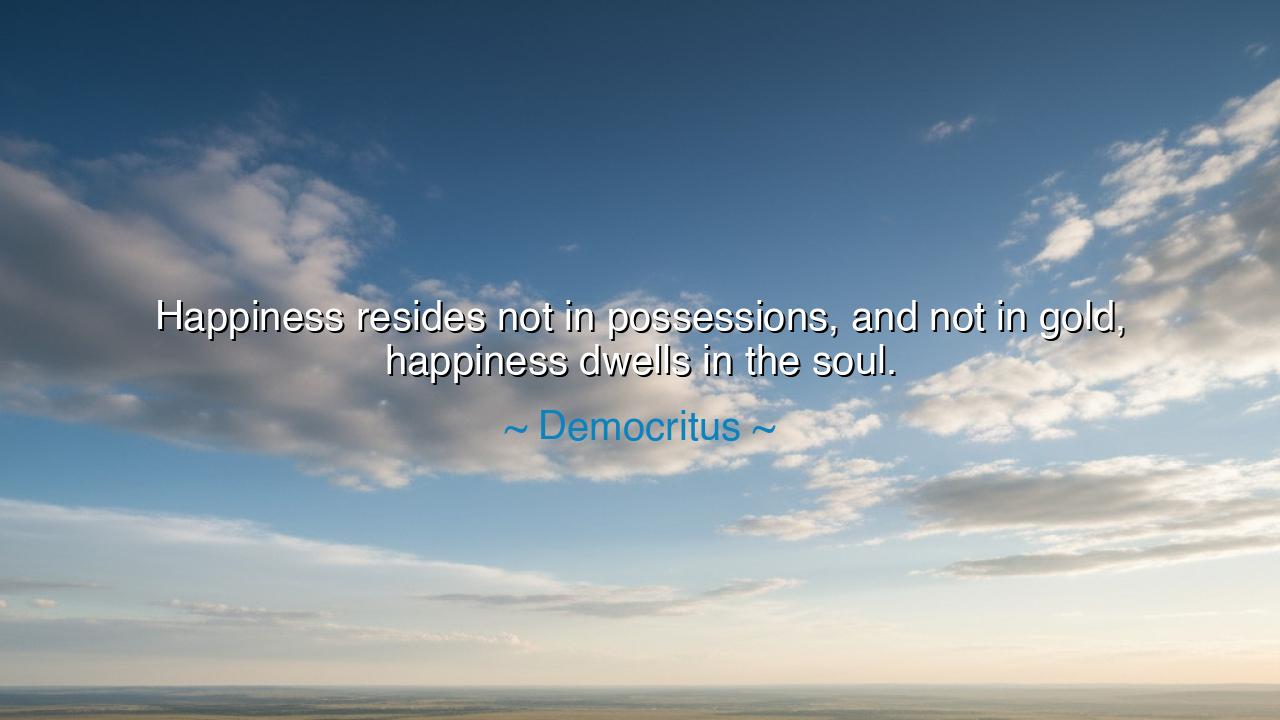
Happiness resides not in possessions, and not in gold, happiness






"Happiness resides not in possessions, and not in gold, happiness dwells in the soul." — Democritus
Thus spoke Democritus, the laughing philosopher of ancient Greece — a man who saw through the illusions of wealth and power and beheld the truth of the human heart. His words, like sunlight upon marble, reveal a timeless law: that happiness is not a treasure buried in the earth, nor a jewel clasped by kings, but a flame that burns within the soul. He reminds us that gold may glitter and possessions may please for a moment, but they are shadows — fleeting and hollow. True joy, enduring and deep, cannot be bought or owned; it must be cultivated, nourished, and lived from within.
Democritus lived in a world that, like ours, worshiped outward success — the wealth of cities, the fame of men, the triumphs of conquest. Yet he saw that those who possessed the most were often the most troubled. The merchant feared loss, the tyrant feared rebellion, and even the poet feared being forgotten. In his wisdom, Democritus turned his gaze inward and found that peace was not in what the hands could hold, but in what the heart could understand. He declared that happiness dwells in the soul — in the harmony of thought, action, and spirit. It is the quiet contentment of one who lives in truth, free from the bondage of endless desire.
To grasp his meaning, one must understand the nature of possessions. They are like water held in the palm — beautiful, useful, even necessary, yet always slipping away. To chase them as the source of happiness is to mistake the reflection for the light. Gold may fill the purse, but it cannot fill the heart. It can purchase comfort, but not peace; indulgence, but not purpose. Democritus saw that men destroy themselves in the pursuit of what they think will bring happiness, yet overlook the source that is always within them. He sought not to condemn material wealth, but to liberate the soul from its enslavement to it.
History itself confirms this eternal truth. Consider Emperor Marcus Aurelius, master of the known world, who ruled with the power of life and death. Yet in his private writings, he confessed that true contentment could not be found in crowns or victories. “The happiness of your life,” he wrote, “depends upon the quality of your thoughts.” Surrounded by luxury and honor, he turned inward to the life of the spirit, seeking wisdom rather than glory. Likewise, Buddha, once a prince surrounded by splendor, renounced his palace and discovered that peace is not found in gold, but in stillness. In these examples, the wisdom of Democritus lives on — that happiness is not a possession, but a state of being.
Yet, this teaching is not a call to renunciation alone; it is a call to balance. Possessions, used wisely, can serve life — but when life is spent serving possessions, the soul decays. The one who is rich in spirit is not he who owns much, but he who needs little. To find happiness, one must turn inward — to the cultivation of gratitude, virtue, and peace. For when the inner world is harmonious, the outer world loses its power to wound. A poor man with a joyful heart is richer than a king imprisoned by greed. The secret of joy is simplicity, and simplicity is born from wisdom.
Democritus himself was known to laugh often, not in mockery, but in enlightenment. His laughter was that of a man who saw the vanity of worldly striving and found freedom in detachment. He understood that to chase endless wants is to live in chains, but to master desire is to live in abundance. This is why he said happiness dwells in the soul — for the soul, when awakened, no longer depends upon fortune. It finds its light in love, in thought, in kindness, in the simple miracle of being alive.
So, my listener, take this teaching to heart. Do not seek happiness in what rusts or fades, but in what endures — the integrity of your actions, the clarity of your mind, the warmth of your spirit. Let gratitude be your gold, and wisdom your wealth. Each day, cultivate stillness and generosity, and you will find that joy arises not from what you gain, but from what you give. Turn inward, as Democritus did, and you will discover that the richest treasure lies not in the marketplace, but in the sanctuary of your own soul.
For in the end, as Democritus taught, happiness is not bestowed by fate, nor purchased by fortune — it is born within, nurtured by virtue, and guarded by peace. The one who knows this walks through life untouched by envy or despair, for he carries his kingdom within him. And though time may strip away all else — wealth, fame, and flesh — the soul that dwells in happiness remains immortal, shining like a star that no darkness can extinguish.






AAdministratorAdministrator
Welcome, honored guests. Please leave a comment, we will respond soon